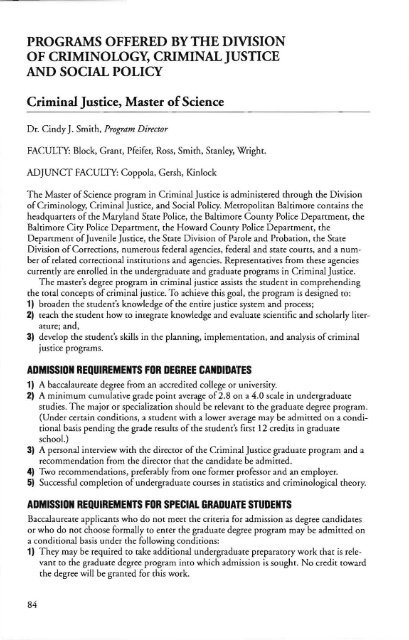2003-2005 - Special Collections - University of Baltimore
2003-2005 - Special Collections - University of Baltimore
2003-2005 - Special Collections - University of Baltimore
Create successful ePaper yourself
Turn your PDF publications into a flip-book with our unique Google optimized e-Paper software.
PROGRAMS OFFERED BY THE DIVISION<br />
OF CRIMINOLOGY, CRIMINAL JUSTICE<br />
AND SOCIAL POLICY<br />
Criminal Justice, Master <strong>of</strong>Science<br />
Dr. Cindy J. Smith, Program Director<br />
FACULTY: Block, Grant, Pfeifer, Ross, Smith, Stanley, Wright.<br />
ADJUNCT FACULTY: Coppola, Gersh, Kinlock<br />
The Master <strong>of</strong> Science program in Criminal Justice is administered through the Division<br />
<strong>of</strong> Criminology, Criminal Justice, and Social Policy. Metropolitan <strong>Baltimore</strong> contains the<br />
headquarters <strong>of</strong> the Maryland State Police, the <strong>Baltimore</strong> County Police Department, the<br />
<strong>Baltimore</strong> City Police Department, the Howard County Police Department, the<br />
Department <strong>of</strong>Juvenile Justice, the State Division <strong>of</strong> Parole and Probation, the State<br />
Division <strong>of</strong> Corrections, numerous federal agencies, federal and state courtS, and a number<br />
<strong>of</strong> related correctional institutions and agencies. Representatives from these agencies<br />
currently are enrolled in the undergraduate and graduate programs in Criminal Justice.<br />
The master's degree program in criminal justice assists the student in comprehending<br />
the total concepts <strong>of</strong> criminal justice. To achieve this goal, the program is designed to:<br />
1) broaden the student's knowledge <strong>of</strong> the entire justice system and process;<br />
2) teach the student how to integrate knowledge and evaluate scientific and scholarly literature;<br />
and,<br />
3) develop the student's skills in the planning, implementation, and analysis <strong>of</strong> criminal<br />
justice programs.<br />
ADMISSION REQUIREMENTS FOR DEGREE CANDIDATES<br />
1) A baccalaureate degree from an accredited college or university.<br />
2) A minimum cumulative grade point average <strong>of</strong>2.8 on a 4.0 scale in undergraduate<br />
studies. The major or specialization should be relevant to the graduate degree program.<br />
(Under certain conditions, a student with a lower average may be admitted on a conditional<br />
basis pending the grade results <strong>of</strong> the student's first 12 credits in graduate<br />
school.)<br />
3) A personal interview with the director <strong>of</strong> the Criminal Justice graduate program and a<br />
recommendation from the director that the candidate be admitted.<br />
4) Two recommendations, preferably from one former pr<strong>of</strong>essor and an employer.<br />
5) Successful completion <strong>of</strong> undergraduate courses in statistics and criminological theory.<br />
ADMISSION REQUIREMENTS FOR SPECIAL GRADUATE STUDENTS<br />
Baccalaureate applicants who do not meet the criteria for admission as degree candidates<br />
or who do not choose formally to enter the graduate degree program may be admitted on<br />
a conditional basis under the following conditions:<br />
1) They may be required to take additional undergraduate preparatory work that is relevant<br />
to the graduate degree program into which admission is sought. No credit toward<br />
the degree will be granted for this work.<br />
84
















